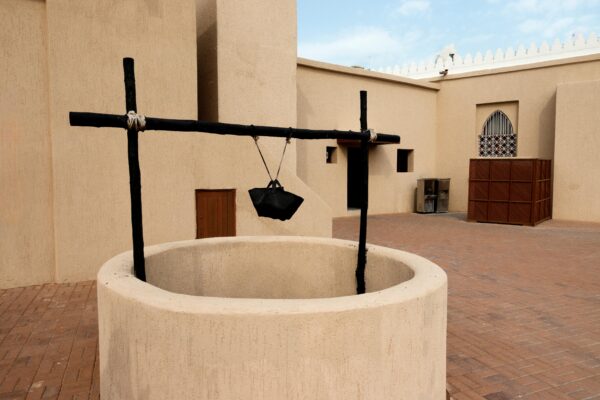
6 Wealth-Building Lessons from Khadijah (RA) Every Muslim Should Know
03 December 2025 8 min read


Adil Hussain
Head of Content
6 min read
Last updated on:
Islam is a practical, modern religion with answers for all the challenges that we face. One major challenge that we are currently facing is how to fix the economy. Issues such as inflation and inequality are causing havoc. Yet Muslims are struggling to present a viable alternative.
Our books of hadith contain pearls of wisdom shared by the Prophet (SAW) and offer us practical lessons that we can implement in our day-to-day lives.
This article will share 3 key insights from the opening hadith on commerce from Sahih Bukhari. These insights were covered in more depth during a webinar co-hosted by us and Mufti Faraz which you can watch here.
Before we analyze the hadith, we need to establish what the historical backdrop was. In the year 622, the Prophet (SAW) and his companions did hijra from Mecca to Medina. As they were escaping persecution, the emigrants arrived in Mecca with little to their name.
One of the companions was none other than Abdur-Rahman ibn Awf (RA), who famously was one of the ten companions to be promised paradise whilst they were still alive. He was a renowned trader but just like the rest, he came to Mecca with little to his name.
Here is the english extract of the hadith which we’ll be extracting insights from:
`Abdur-Rahman ibn `Awf said, “When we came to Medina as emigrants, Allah’s Messenger (ﷺ) established a bond of brotherhood between me and Sa`d ibn Ar-Rabi`.
Sa`d bin Ar-Rabi` said (to me), ‘I am the richest among the Ansar, so I will give you half of my wealth and you may look at my two wives and whichever of the two you may choose I will divorce her, and when she has completed the prescribed period (before marriage) you may marry her.’
`Abdur-Rahman replied, “I am not in need of all that. Is there any marketplace where trade is practiced?’ He replied, “The market of Qainuqa.”
`Abdur-Rahman went to that market the following day and brought some dried buttermilk (yogurt) and butter, and then he continued going there regularly. Few days later, `Abdur-Rahman came having traces of yellow (scent) on his body.
Allah’s Messenger (ﷺ) asked him whether he had got married. He replied in the affirmative. The Prophet (ﷺ) said, ‘Whom have you married?’ He replied, ‘A woman from the Ansar.’ Then the Prophet (ﷺ) asked, ‘How much did you pay her?’ He replied, ‘(I gave her) a gold piece equal in weight to a date stone (or a date stone of gold)! The Prophet (ﷺ) said, ‘Give a Walima (wedding banquet) even if with one sheep.’ (Sahih Bukhari; 2048)
The first insight that we can glean from this hadith is the importance of collaboration.
‘When we came to Medina as emigrants, Allah’s Messenger (ﷺ) established a bond of brotherhood between me and Sa`d bin Ar-Rabi`.’
When the Muhajirun (emigrants) arrived in Madina, the Prophet (SAW) paired each of them with a person from the Ansar (the helpers). This was an incredibly wise and strategic decision as it managed to avert a potential crisis.
Just imagine the situation at the time. A group of emigrants who have just escaped persecution arrived in a new city with few prospects. They had left everything they knew and only had what little they managed to carry with them to their name. How must the existing residents have felt?
In today’s time, many people would be worried about their own economic prospects. This could have caused a major issue for the city.
By pairing people and establishing ties of brotherhood, the emigrants were able to quickly settle and eventually help the entire city to prosper even more than before. Medina would eventually become the hub from which the Islamic nation was able to transform the world.
This masterstroke preserved the economic stability of Medina and served to increase community cohesion at a critical time.
Arguably, this approach has been followed with the Ukrainian refugee crisis. However, in the modern day world, there are huge opportunities to develop tech platforms connecting refugees with locals, or dedicated programmes to facilitate the settlement of refugees.
Mercy Mission, for instance, are doing excellent work in this space.
Abdur-Rahman was paired with Sa`d, who was the richest man amongst the Ansar. Such was the generosity of Sa’d and his love for Islam and the Prophet (SAW), that he offered half of his wealth to Abdur-Rahman!
Sa`d bin Ar-Rabi` said (to me), ‘I am the richest among the Ansar, so I will give you half of my wealth and you may look at my two wives and whichever of the two you may choose I will divorce her, and when she has completed the prescribed period (before marriage) you may marry her.’
Yet Abdur-Rahman declined his offer. It would be similar to Bill Gates offering us half of his wealth. How many of us would turn that offer down?
Just think about the self-belief Abdur-Rahman possessed and his tawakkul (trust) in Allah SWT, for him to reject such an offer. All Abdur-Rahman asked for was to be directed to the market.
`Abdur-Rahman replied, “I am not in need of all that. Is there any marketplace where trade is practiced?’
Having the drive to create value in the economy yourself is a key learning point here. Entrepreneurship isn’t a skill that people are born with – it’s often born out of necessity.
Have tawakkul in Allah and make the most out of the talents that you have been blessed with.
Schemes nowadays that encourage people to take up new skills (like the UK Skill Toolkit) or get into entrepreneurship would seem to follow this model. Modern economies could take this even further by reforming the welfare system to move from a payout system to a bursary system that combines welfare with learning.
Abdur-Rahman went to the market with just the wealth that he had with him, which was said to be around 2-4 dinars. A dinar at the time was said to be worth 4.25 grams of gold.
So at today’s gold price per gram of ~$58, Abdur-Rahman would have had between $493 – $986.
`Abdur-Rahman went to that market the following day and brought some dried buttermilk (yogurt) and butter, and then he continued going there regularly.
A few days later, `Abdur-Rahman came having traces of yellow (scent) on his body. Allah’s Messenger (ﷺ) asked him whether he had got married. He replied in the affirmative.
This shows us that you can work with what you have. You don’t necessarily need a large amount of savings or need to raise funds to be an entrepreneur.
This concept is known as “bootstrapping” in modern day business. People make the mistake of thinking you need to have an idea and raise loads of funds for it. It’s just not true. The key to business is a really simple one: make more money than you spend.
If you do that consistently over a long period of time, you will amass a large business.
Grit and determination are key traits to boost the economy.
We also then learn that just a short while later, he had gotten married. This shows that he had already made enough money to do so. We can also learn a lot regarding marriage from this.
Abdur-Rahman didn’t hesitate to get married, he hastened to do so even though he had just arrived in a new city. As soon as he had enough money, he went ahead and did it. This is a good reminder to any budding entrepreneurs out there, that you can balance your career with being married.
A family unit and the responsibility that comes with having to sustain that family unit has driven a lot of value creation.
We’ve only scratched the surface of all the wisdom contained in this single hadith. The Prophet’s wisdom instantly shines through and in the example of Abdur-Rahman, each of us has a role model whom we can seek to emulate.
Ahadith are there for us to reflect and take practical insights from. There is a wealth of untapped knowledge and gems that could transform our lives and the wider community. Studying hadith will also help you to foster a closer bond to the Prophet (SAW) along the way.
If you’re interested in learning more, check out our groundbreaking new 2-year course ‘The Messenger’s Money Morals’. The course will use the study of key ahadith with one of the most prominent Islamic Finance muftis around today – Mufti Faraz Adam – from the major books of hadith to help students really internalise the Prophet’s money morals, explore modern principles of Islamic finance, outline applications to modern investment techniques and structures and more.

03 December 2025 8 min read

26 November 2025 6 min read

13 August 2025 12 min read
Leave a Reply